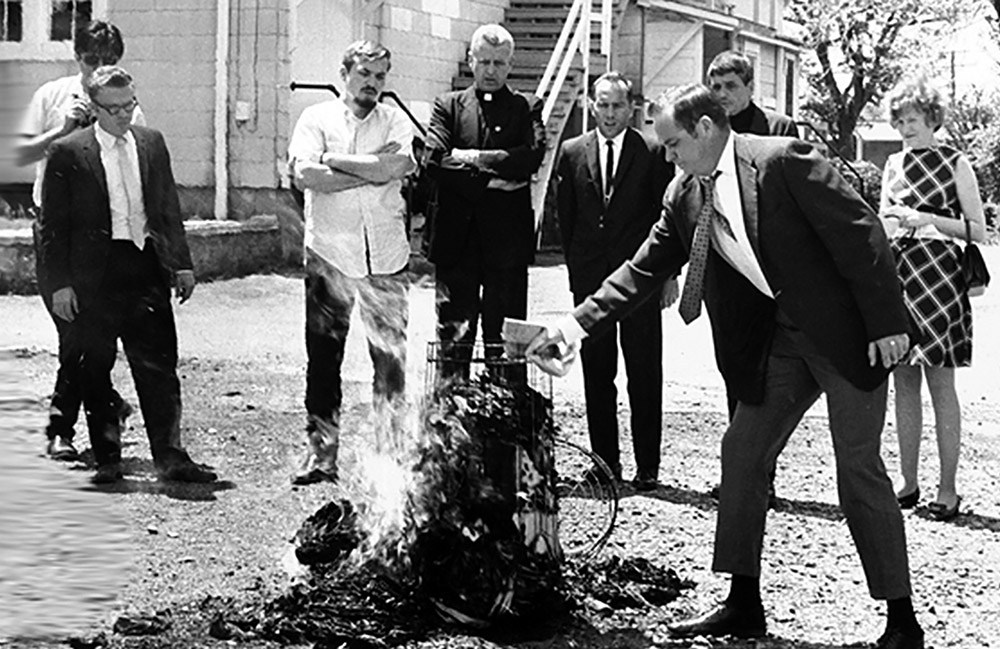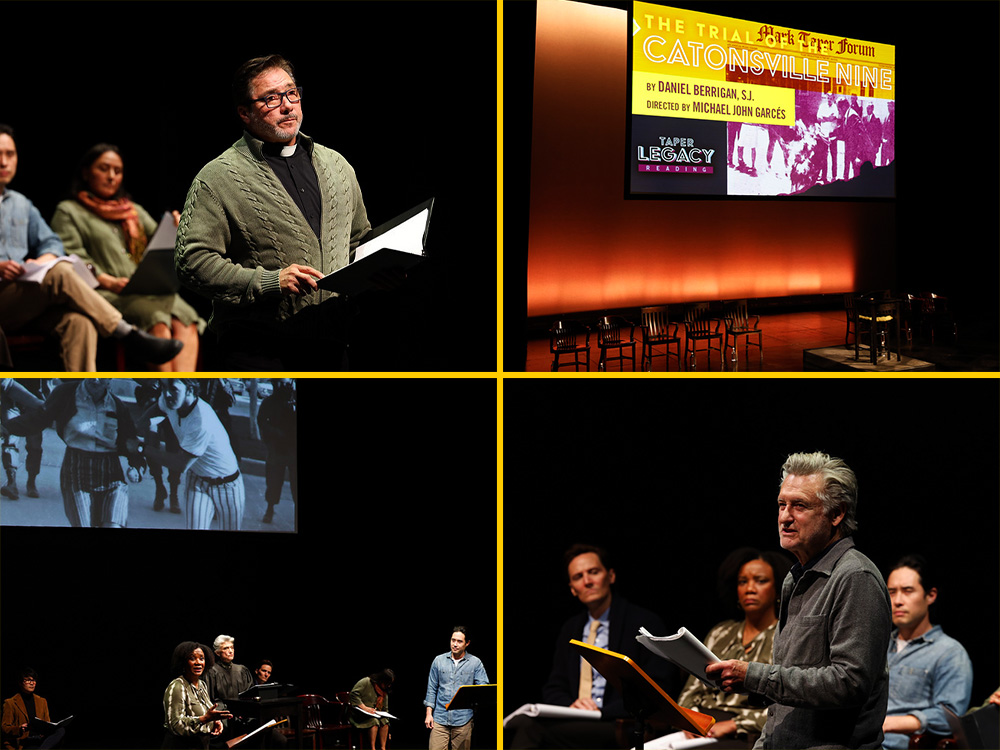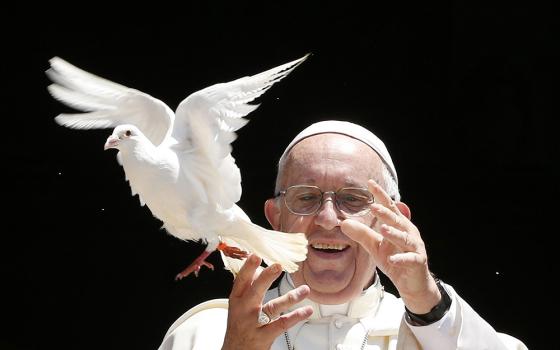
The Catonsville Nine were nine Catholic activists who burned draft files to protest the Vietnam War. On May 17, 1968, they entered a draft board in Catonsville, Md., took 378 draft files, brought them to a nearby parking lot and set them on fire with homemade napalm. Then they sang, prayed, spoke with reporters and waited to be arrested by the Baltimore County police. (CNS/www.catonsville9.org)
Daniel and Philip Berrigan. Thomas and Marjorie Melville. George Mische. Mary Moyland. David Darst. John Hogan.
Progressive Catholics who made international news in 1968 when they broke into a Selective Service office in the Baltimore suburb of Catonsville, took 378 draft files, and burned them outside in front of news cameras with the help of homemade napalm. Celebrity defendants when the group — nicknamed the Catonsville Nine — were tried and convicted for their action a few months later. Fugitives when Moylan, the Berrigans, and Mische went on the run instead of turning themselves in for their prison sentences (Phillip and Mische were captured within 10 days, authorities caught up to Daniel months later, and Moylan finally surrendered in 1979). Prophets of peace for the rest of their lives.
I knew none of this history two and a half months ago, even though I proudly identify as a member of the Catholic left.
But this spring, the Los Angeles-based Center Theatre Group reached out to see if I'd be interested in helping them with a reading of "The Trial of the Catonsville Nine," an award-winning play that Daniel Berrigan originally wrote as a tone poem in 1970 based on the transcripts from the trial.
My task: serve as dramaturg, which basically meant I had to comb through archives and newspaper clippings to learn about the life and times of the defendants, then share my findings with the actors who would play the Nine for one night as part of Center Theater Group's series of reading important productions in their history. I also had to write a timeline and program note, and give a lecture after the reading that tied the protagonists and the play to the present day.
A study project on the dime of one of the most prestigious theater companies in the United States? Where do I sign!
Advertisement
Even though it was my first time doing something like this, I knew it would be a fruitful experience no matter what happened. I had a chance to learn about Catholics who altered the course of U.S. history. I was up for the challenge of convincing audience members that a 54-year-old play and its central concept — defy Caesar in the name of Christ — remained relevant.
What I didn't expect was how profound the experience would be for my Catholicism.
Research began with a visit to the Young Research Library at my alma mater, UCLA, where Center Theatre Group's archives are located. In a stately, quiet room, I went through two boxes that contained hundreds of letters, memos, clippings and photos related to "The Trial of the Catonsville Nine."
There were character bios of each protagonist (example: Mische was "burly, quickwitted, voluble, with a blond mustache and a luminous, demonic smile") that I immediately had an intern share with all the actors before their first rehearsal.
I also came across angry letters from Catholics and non-Catholics alike calling Berrigan's work blasphemous, along with profiles from Time magazine, The New York Times, the Los Angeles Times, and dozens of smaller publications.
I quickly learned that "The Trial of the Catonsville Nine" was the talk of the town, because it was a reflection of art imitating life. The lesson was actually a bit too much on the nose: The day I went to Young Research Library, a pro-Palestinian encampment set up in front of nearby Powell Library, where the papers of "The Trial of the Catonsville Nine" director Gordon Davidson were housed. Because of the violence that befell the encampment — a group of opponents attacked it on May 1, and hundreds of law enforcement agents cleared the tent city the following night — I was never able to return to UCLA.
That was the power of the play and its protagonists then and now, I told the modern-day cast when I finally met them.
But public actions weren't the Nine's main motivation. I explained how the Nine had pledged their lives to helping out the less fortunate in the name of the Catholic Church and the United States by joining religious orders — Maryknoll, the Josephites, the Jesuits — but turned on church institutions when their silence on or support for American imperialism proved too much. I urged the cast to channel that sense of betrayal that liberal Catholics had with American bishops and cardinals in the wake of the 1962-65 Second Vatican Council.
I also read them a Los Angeles Times review from the first iteration of the play, a 1970 production at the Mark Taper Auditorium as part of a Center Theatre Group initiative for new plays. The review ridiculed the characters as "those self-satisfied little child martyrs that Sister Mary used to love to tell the third grade about on rainy afternoons," and the cast for "bearing that suffering liberal look."
The Nine never considered themselves pious, I reminded the new cast. They were imperfect, just like the rest of us.
It was amazing to see the actors inhabit their role, and humbling to have them and director Michael John Garcés — who cast the production blind, which meant it was multicultural and had three women play the roles of men — use my notes to better their performances.
Hearing them slowly go through the script, I felt the Spirit in the room. It motivated others as well to share their own Catholic lives. One cast member told me how her uncle was a Jesuit who served in Uganda, but only until joining the "Catonsville Nine" production did she realize how important his work was. Someone else brought her Communion rosary to proudly show me, then admitted she didn't go to Mass much anymore.
Neither did I, I responded. But here, right now, was our own Communion.

Actors in Center Theatre Group's reading of "The Trial of the Catonsville Nine" included Benito Martinez as Phillip Berrigan (top left); Tijuana Ricks as Marjorie Melville, Amy Aquino as the Judge, and Raymond Lee as Thomas Melville (bottom left, standing); and Bill Pullman as Daniel Berrigan (bottom right). (Capture Imagery/Molly O'Keeffe)
The finished production was staged at the Mark Taper Auditorium in downtown LA before a sold-out crowd, a day after the anniversary of the Nine's holy inferno. There were cheers and boos and gasps, and a standing applause from the audience at the end. After a 10-minute break, it was my turn to talk.
I told the crowd about the excitement and challenges of being a Catholic progressive in the 1960s, and the controversy over the play's 1971 run at the Taper. I made a joke about the nearby Cathedral of Our Lady of the Angels, lorded over by Archbishop José Gomez, who has never met with members of the Los Angeles branch of the Catholic Worker despite their repeated requests for one.
My remarks got laughs, but when I mentioned former LA Cardinal James Francis McIntyre — who openly clashed with Chicano Catholics and infamously went after progressive nuns — not only did I hear jeers, but bona fide hisses.
Now it was my turn to laugh. What a smart crowd, I remarked!
After I finished, I found the probable source of the raspberries: members of the Immaculate Heart Community, the offshoot of the Immaculate Heart Sisters who famously left the order after clashing with McIntyre over their attempts to modernize. They thanked me for my speech, and I was introduced to Lenore Dowling, one of the stars of the 2021 documentary "Rebel Hearts," which tells the stories of the Immaculate Heart Sisters-McIntyre war.
I hope that the audience was as moved by the witness of the Catonsville Nine as I was. Serving as dramaturg and learning about the Nine reminded me that the Catholic Church is imperfect, but I should never abandon it. As the Berrigan brothers were fond of saying, she may be a sinner, but she is our mother.
And I was also reminded of the power of the stage. A few years ago, the play "Heroes of the Fourth Turning" earned praise for its depiction of conservative Catholics debating Trump's America. Who is up for writing a progressive version of that?
I know a rookie dramaturg who can help.






